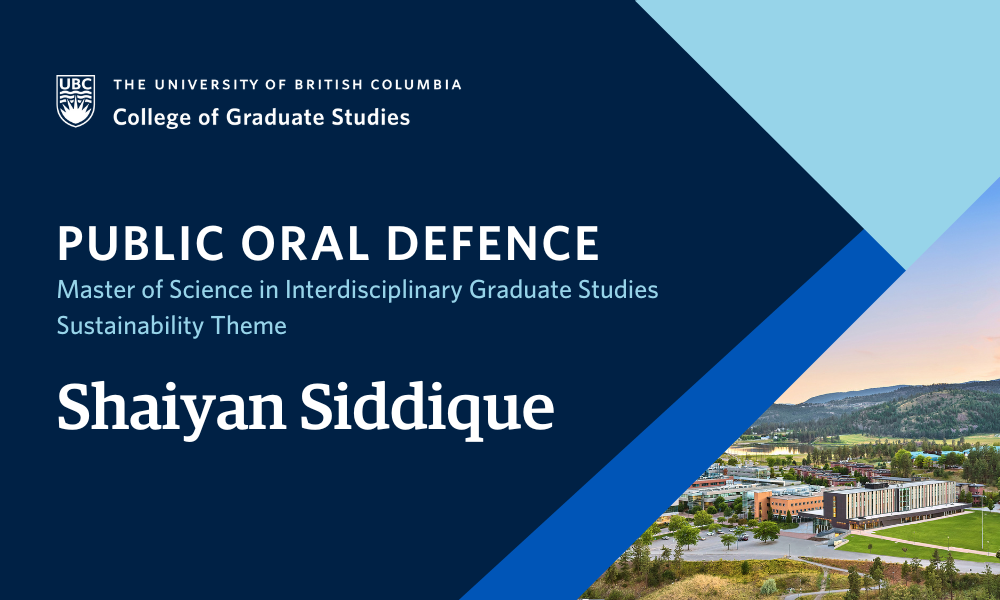
- This event has passed.
Thesis Defence: Evaluating The Environmental Performance of a Valorized Grocery Food Waste Product and its Potential Use as a Sustainable Feed Input for the Canadian Egg Industry
July 4, 2024 at 12:00 pm - 4:00 pm

Shaiyan Siddique, supervised by Dr. Nathan Pelletier, will defend their thesis titled “Evaluating The Environmental Performance of a Valorized Grocery Food Waste Product and its Potential Use as a Sustainable Feed Input for the Canadian Egg Industry” in partial fulfillment of the requirements for the degree of Master of Science in Interdisciplinary Graduate Studies – Sustainability theme.
An abstract for Shaiyan Siddique’s thesis is included below.
Defences are open to all members of the campus community as well as the general public. This examination will be offered in hybrid format. Registration is not required to attend in person, but please email nathan.pelletier@ubc.ca to receive the Zoom link for this defence.
ABSTRACT
Food waste remains a major sustainability challenge in the world today with serious environmental, socio-economic, and moral implications. Livestock farming is another major sustainability challenge, notably due to the demand for feed inputs. Directly valorizing food wastes to livestock feed at a commercial scale has hence emerged as a promising approach to solve both of those problems. Case studies of such facilities operating at a commercial scale are limited, particularly in western countries. Hence, there exists a recognized knowledge gap surrounding their environmental performance, which this study aims to fill by conducting a cradle-to-gate Life Cycle Assessment (LCA) study of a commercial scale grocery waste-to-poultry feed input production system based in Pennsylvania, and it’s use in the context of egg production in Canada. LCA is recognized as the most appropriate and commonly used tool for conducting a holistic, multi-criteria assessment of potential interventions aimed at improving sustainability outcomes at a systems level. Findings for the valorized product system showed negative burdens (indicating a net environmental benefit) for the GWP20 and eutrophication impact categories. This was due to avoided landfill emissions which offset the impacts across these two categories and reduced the footprint for several others. Using the adjusted feed in egg production reduced the life cycle environmental impacts of conventional Canadian eggs in 10 out of 11 impact categories, including a 15.5% impact reduction in GWP20. However, the fossil fuel depletion impact category saw a 58% increase in impacts, due to the energy intensive manufacturing process of the valorized input and Pennsylvania’s reliance on fossil fuel for electricity production. Several contribution, scenario and sensitivity analyses were conducted. The findings highlighted the importance of utilizing green energy sources, along with improved transportation and substrate drying technologies for this food waste valorization system. The study also highlighted the need for further research and feeding trials to optimize the inclusion rate of the valorized product in poultry feeds. Other key areas for future research include better resolved consideration of regional, infrastructural, and logistical contexts, as well as the need for improved calculation methods for estimating avoided landfill gas emissions and economic viability assessment.